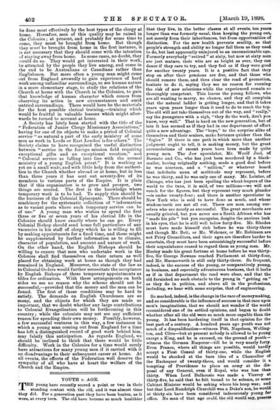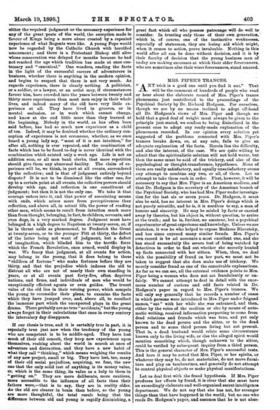YOUTH v. AGE. T HE young have recently scored a point
or two in their standing contest with the old, and it was almost time they did. For a generation past they have been beaten, as it were, at every turn. The old have become so much healthier that they live, in the better classes at all events, ten years longer than was formerly usual, thus keeping the young out, not merely from their inheritances, but from opportunities of distinction. For the new health prevents senility, so that people's strength and ability no longer fail them as they used to do, but last apparently uninjured to an unconscionable age. Formerly everybody "retired" at sixty, but now at sixty men are just mature, their wits are as bright as ever, they can dance if they care to try, and they feel as if they were good for another twenty years. It is a positive fact that they stop on after their pensions are due, and that those who should remove them, and thus clear the road of promotion, hesitate to do it, saying they see no reason for running the risk of new selections while the experienced remain so thoroughly competent. This leaves the young fellows, who are all wanting to marry, no chance, and they all complain that the natural ladder is getting longer, and that it takes years upon years longer than it used to do to reach the top. The old will not take themselves out of the way, and "really," say the youngsters with a sigh, "they do the work, don't you know, very well." That is hard on the new generation, but of late it has seemed as if they bad in one department of effort quite a new advantage. The "boys," to the surprise alike of themselves and their seniors, make fortunes quicker than the "fogies." If there is one path in which more than another judgment ought to tell, it is making money, but the great accumulations of recent years have been made by quite young men. The Jew speculator, Mr. Woolf Joel, of Barnato and Co., who has just been murdered by a black- mailer, having originally nothing, made a good deal before be was nineteen, and a "million," or whatever hoard that indefinite noun of multitude may represent, before he was thirty, and he was only one of many. Mr. Leinter, of Chicago, who has just been spoiling the wheat-buyers of the world to the tune, it is said, of two millions—we will not vouch for the figures, but they represent very much plunder —is under twenty-four ; and there is another speculator in New York who is said to have done as much, and whose wisdom-teeth are not all cut. There are men among our- selves who are nearly as successful. The great merchants are usually grizzled, but you never see a South African who has "made his pile" but you recognise, despite the anxious look in his eyes, that he is still well below forty-five. Mr. Rhodes must have made himself rich before he was thirty-three and though Mr. Beit, or Mr. Wehrner, or Mr. Robinson are not Privy Councillors, and their ages are therefore harder to ascertain, they must have been astonishingly successful before their acquaintance ceased to regard them as young men. Mr. Hooley made his great fortune at home before he was thirty- five, Sir George Newnes reached Parliament at thirty-four, and Mr. Harmsworth is still only thirty-three. So frequent, indeed, is the success of the young, or comparatively young, in business, and especially adventurous business, that it looks as if in that department the road were clear, and that the old furnished no such obstacle to the young in "getting on" as they do in politics, and above all in the professions, including, we hear with some surprise, that of engineering.
So marked, indeed, is the change in the race of moneymaking, and so considerable is the influence of success in that race upon men's imaginations, that we should not wonder if the world reconsidered one of its settled opinions, and began to doubt whether after all the old were so much more capable than the young. It has been hardening itself in that opinion for the best part of a century. A hundred years ago youth was not much of a disqualification—witness Pitt, Napoleon, Welling- ton, and Clive—but at present nobody is allowed to be young except a King, and he is excused, on the ground of youth— witness the German Emperor—till he is very nearly forty. Even France, where all things are possible, would hardly accept a First Consul of thirty-one, while the English would be shocked at the bare idea of a Chancellor of the Exchequer of twenty-three, and would consider it a tempting of Providence to place an army at the dis- posal of any General, even if Royal, who was less than thirty. When Lord Dalhousie was made a Viceroy at thirty-five, he said that he felt bound to be solemn, or some Cabinet Minister would be asking where his hoop was ; and but that Lord Randolph Churchill was a Duke's son, he would at thirty-six have been considered indecorously young for office. No man of that age could. the old would say, possess eithet the required judgment or the necessary experience for Any of the great posts of the world, the exoeption made in favour of Kings being a mere abuse created by a repeated experience of what Regents were like. A young Pope would now be regarded by the Catholic Church with horrified amazement ; and there is a Protestant Bishop still alive whose consecration was delayed for months because be had not reached the age which tradition has made at once cus- tomary and "canonical." One wonders, reading the facts in the light of the successful careers of adventurers is business, whether there is anything in the modern opinion, and begins to suspect that there is not very much. As regards experience, there is clearly nothing. A politician, or a soldier, or a lawyer, or an artist may, if circumstances favour him, have crowded into the years between twenty and thirty more experiences than most men enjoy in their whole lives, and indeed many of the old have very little ex- perience at all. They have lived in grooves, or in mental seclusion, or in work which cannot change, -and know at the end little more than they learned at the beginning. Nobody in the world, as has often been said before, has had so much new experience as a child of ten. Indeed, it may be doubted whether the ordinary con- ception of experience is not erroneous, whether, as we once heard a young lady say, "moat of it is not intuition," for after all, nothing is ever repeated, and the combination of facts which has to be faced to-day is never identical with the combination which existed only a week ago. Life is not an addition sum, or all men bank clerks, that mere repetition should give them any abnormal facility. The claim of ex- perience will be, we think, in part at all events, surrendered by the reflective ; and is that of judgment entirely beyond dispute ? It is not to be dismissed like the other one, for up to a certain point at all events, the reflective powers should develop with age, and reflection is one constituent of 'Iudgment; but then it is not the only one. We take it that courage enters into it, and that power of associating means with ends, which arises more from perceptiveness than reflection, and above all, in actual life, the power of reading other men, which seems to result from intuition much more than from thought, belonging, in fact, to children, servants, and even dogs, in a very marked degree. Judgment must have belonged in a high degree to Napoleon at twenty-seven, or, if he is thrust aside as phenomenal, to Frederick the Great at twenty-seven, or to the younger Pitt at thirty, the defect of the latter being not want of judgment, bat a defect of imagination, which blinded him to the terrific force which the French Revolution, once armed, would display in war. We fancy that judgment, at all events for action, may belong to the young, that it does belong to these "children of fortune" who make fortunes before they are thirty, and that the prejudice which induces the old to distrust all who are not of nearly their own standing in years, or at all events past forty-five, often deprives nations, and firms, and individuals of men who would be exceptionally efficient agents or even guides. The truest value of the old lies in their vetoing power, which compels the young to reconsider their plans, to examine the facts which they have jumped over, and, above all, to recollect the immense part which the unexpected plays in the great drama. There probably are no true " accidents," but the young always forget in their calculations that once in every century the intercalary day disappears.
If our thesis is true, and it is certaibly true in part, it is especially true just now when the tendency of the young who are competent is to be middle-aged. They have lost much of their old conceit, they heap new experiences upon themselves, rushing about the world in search at once of adventure and distraction, and they have a new habit of what they call "thinking," which means weighing the results of any new project, small or big. They have lost, too, many of their old social prejudices, acquiring, we fear, the new one that the only solid test of anything is its money value, or, which is the same thing, its value as a help to them in "getting on." They are more deliberate, more cautious, more accessible to the influence of all facts than their fathers were,—that is to say, they are in reality older. As the old are clearer in brain than before, so the young are more thoughtful, the total result being that the difference between old and young is rapidly diminishing, a great fact which -all who possess patronage will do well to consider. In trusting only those of their own generation, which is, of course, one of the instinctive weaknesses, especially of statesmen, they are losing aid which might, when it comes to action, prove invaluable. Nothing in this world after all can be done without decision, and it is by their faculty of decision that the young business men of to-day are making successes at which their older forerunners, who are sometimes also their wiser forerunners, stand amazed.







































 Previous page
Previous page